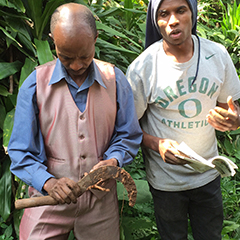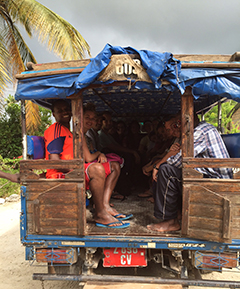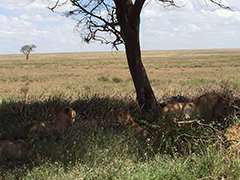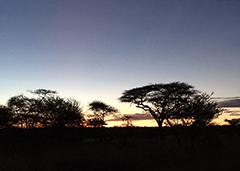Insects humming over elephant and lion dung provide the soundtrack for this letter. If you were sitting beside me, you’d seen the long open expanse of the Serengeti plains. It’s a harsh but beautiful environment – and the students remind me that this is how they think of Africa. It’s as “Lion King” as them come. A giraffe? NOW we’re in Africa. Gazelles butting heads? NOW we’re in Africa. Impossibly long vistas fading into a clear blue horizon? Yes, this is Africa. I hadn’t been to Serengeti since 1998, so this has been a fun, if long, excursion.
Our student Greg went to Mowo on a medical caravan team. He triaged more than 110 patients who were seen in five hours by four doctors. Not exactly naturopathic style. When there are hundreds of people who haven’t had medical care since the last medical caravan a year ago, there isn’t much time for building relationships. People complain about the medical system in the US – and I agree that we have disease management rather than health care. However, at least we have a medical system. I think the system here is beyond repair. It just needs a whole new strategy.
 Greg observed case after case of maladies and disease that should have been easily prevented. For example, lots of fungal skin infections presented to the caravan of doctors. It’s cold on Kilimanjaro, and there’s no hot water for showering. So people give themselves sponge baths – sometimes. And the lack of bathing and wearing the same clothes day in and day out has lead to fungal skin infections. Is there a plant medicine that would treat the fungal infections? Of course there is, and Eliphas’ uncle pointed it out to us our herb walk. However, the plant is almost gone, he tells us. Plant medicine is only sustainable if the plant continues to grow and isn’t over-used.
Greg observed case after case of maladies and disease that should have been easily prevented. For example, lots of fungal skin infections presented to the caravan of doctors. It’s cold on Kilimanjaro, and there’s no hot water for showering. So people give themselves sponge baths – sometimes. And the lack of bathing and wearing the same clothes day in and day out has lead to fungal skin infections. Is there a plant medicine that would treat the fungal infections? Of course there is, and Eliphas’ uncle pointed it out to us our herb walk. However, the plant is almost gone, he tells us. Plant medicine is only sustainable if the plant continues to grow and isn’t over-used.
The medical caravan traveling with Greg had limited amounts of medicine. So they ran out. And the clinic already had very short supplies of medicine. So the doctors would see patients, and then tell people that they needed to go to Moshi to get their medicine. And we already know that they won’t go. They can’t. It’s not an easy drive to a Walgreens or a Target. It’s a long journey in a dala dala – and it may require an overnight stay. Greg and another student wondered if Amazon could employ their drones to deliver medicine to Moshi. Now there’s an interesting idea.
We have spent a lot of time discussing public health issues – access to care being the most obvious. But the underlying issue of course is poverty. Until poverty can be addressed, there may never be a doctor in Moshi. The villagers may always feel helpless when the only medicines they have access to don’t work. And addressing systemic poverty has wiser minds than mine working on it.
 One cool thing about doing a global health course in Africa is that you can deliver lessons in the jeeps on the way too cool places… like Serengeti. And that’s what we did yesterday. As we made our way from Moshi to Ngorogoro Crater and then Serengeti, the students started their tropical disease course. In reality, they’ve already learned a ton about tropical disease as we had them do differential diagnoses for Malaria, Chikengunya, Dengue, and Typhoid. But now they started getting the real curriculum. And they finished just in time to reach the rim of the Ngorogoro Crater. An amazing sight. However, we weren’t stopping at Ngorogoro this year. We kept going and going and going and going… Google says it’s 6 hours. Google doesn’t know the dirt roads. 14 hours from Moshi by jeep, we reached Serengeti.
One cool thing about doing a global health course in Africa is that you can deliver lessons in the jeeps on the way too cool places… like Serengeti. And that’s what we did yesterday. As we made our way from Moshi to Ngorogoro Crater and then Serengeti, the students started their tropical disease course. In reality, they’ve already learned a ton about tropical disease as we had them do differential diagnoses for Malaria, Chikengunya, Dengue, and Typhoid. But now they started getting the real curriculum. And they finished just in time to reach the rim of the Ngorogoro Crater. An amazing sight. However, we weren’t stopping at Ngorogoro this year. We kept going and going and going and going… Google says it’s 6 hours. Google doesn’t know the dirt roads. 14 hours from Moshi by jeep, we reached Serengeti.
 It was worth the 14 hours. Zebras, giraffes and ostrich kept the students entertained as we bumped along the road. Not long into the sunset at Serengeti, we came upon a lion chilling by the side of the road – a massive male lion with a huge mane. One of the students said her life was now complete. Of course, she’d been saying that with almost every new experience. They were happy to be on safari. They’ve seen a whole slew of animals. I could give you a list (lions, hippos, giraffe, buffalo, cheetah, honey badger), but then, you could just watch the Lion King and see them all.
It was worth the 14 hours. Zebras, giraffes and ostrich kept the students entertained as we bumped along the road. Not long into the sunset at Serengeti, we came upon a lion chilling by the side of the road – a massive male lion with a huge mane. One of the students said her life was now complete. Of course, she’d been saying that with almost every new experience. They were happy to be on safari. They’ve seen a whole slew of animals. I could give you a list (lions, hippos, giraffe, buffalo, cheetah, honey badger), but then, you could just watch the Lion King and see them all.
 The students are camping in Serengeti. Fun right? Yes, and it was the only way we could afford to have the students afford to stay here. I decided that the last thing that this trip needed was another sick instructor. And a night camping would likely make me sleep deprived and susceptible. So Elizabeth (the other faculty member) and I are in a formal tented camp about 15 minutes from the students. Even though I’m in a bed, my sleep was disrupted last night. First there was a hyena crying. And then I could hear rumbling outside my tent. I woke up and initially thought ‘bear!’ But there are no bears in Serengeti. It was a lion. I found out this morning from the camp staff that it was actually a pride of lions – many many lions wandered through the camp. Gulp. Needless to say, I survived. It was a little nerve-wracking to think of that many lions a piece of canvas away from me. But then, there’s a cape buffalo that keeps snorting outside the back window of my tent as I write this letter. And the cape buffalo is one of the few animals that even a lion can’t take down.
The students are camping in Serengeti. Fun right? Yes, and it was the only way we could afford to have the students afford to stay here. I decided that the last thing that this trip needed was another sick instructor. And a night camping would likely make me sleep deprived and susceptible. So Elizabeth (the other faculty member) and I are in a formal tented camp about 15 minutes from the students. Even though I’m in a bed, my sleep was disrupted last night. First there was a hyena crying. And then I could hear rumbling outside my tent. I woke up and initially thought ‘bear!’ But there are no bears in Serengeti. It was a lion. I found out this morning from the camp staff that it was actually a pride of lions – many many lions wandered through the camp. Gulp. Needless to say, I survived. It was a little nerve-wracking to think of that many lions a piece of canvas away from me. But then, there’s a cape buffalo that keeps snorting outside the back window of my tent as I write this letter. And the cape buffalo is one of the few animals that even a lion can’t take down.
This group of students is nothing short of amazing. They get along well and are flexible. A couple of them have some minor sicknesses – upper respiratory and GI – but nothing that they are complaining about. These we can handle.
Love from Tanzania,
Heather
